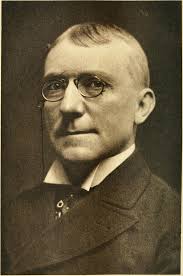Armazindy Page #7
James Whitcomb Riley poems book published in the 1894 book Armazindy and received very negative reviews that referred to poems like "The Little Dog-Woggy" and "Jargon-Jingle" as "drivel" and to Riley as a "worn out genius". Most of his growing number of critics suggested that he ignored the quality of the poems for the sake of making money.
And the earth, as the stress drew near it, Quailed as in mute affright; The grass in the green fields quivered— The waves of the smitten brook Chillily shuddered and shivered, And the reeds bowed down and shook. Like a sorrowful miserere It sobbed, and it blew and blew, Till the leaves on the trees looked weary, And my prayers were weary, too; And then, like the sunshine’s glimmer That failed in the awful strain, All the hope of my eyes grew dimmer In a spatter of spiteful rain. MY HENRY He’s jes a great, big, awk’ard, hulkin’ Feller,—humped, and sorto’ sulkin’- Like, and ruther still-appearin’— Kind-as-ef he wuzn’t keerin’ Whether school helt out er not— That’s my Henry, to a dot! Allus kindo’ liked him—whether Childern, er growed-up together! Fifteen year’ ago and better, ’Fore he ever knowed a letter, Run acrosst the little fool In my Primer-class at school. When the Teacher wuzn’t lookin’, He’d be th’owin’ wads; er crookin’ Pins; er sprinklin’ pepper, more’n Likely, on the stove; er borin’ Gimlet-holes up thue his desk— Nothin’ that boy wouldn’t resk! But, somehow, as I was goin’ On to say, he seemed so knowin’, Other ways, and cute and cunnin’— Allus wuz a notion runnin’ Thue my giddy, fool-head he Jes had be’n cut out fer me! Don’t go much on prophesyin’, But last night whilse I wuz fryin’ Supper, with that man a-pitchin’ Little Marthy round the kitchen, Think-says-I, “Them baby’s eyes Is my Henry’s, jes p’cise!” THE SONG I NEVER SING As when in dreams we sometimes hear A melody so faint and fine And musically sweet and clear, It flavors all the atmosphere With harmony divine,— So, often in my waking dreams, I hear a melody that seems Like fairy voices whispering To me the song I never sing. Sometimes when brooding o’er the years My lavish youth has thrown away— When all the glowing past appears But as a mirage that my tears Have crumbled to decay,— I thrill to find the ache and pain Of my remorse is stilled again, As, forward bent and listening, I hear the song I never sing. A murmuring of rhythmic words, Adrift on tunes whose currents flow Melodious with the trill of birds, And far-off lowing of the herds In lands of long ago; And every sound the truant loves Comes to me like the coo of doves When first in blooming fields of Spring I heard the song I never sing. The echoes of old voices, wound In limpid streams of laughter where The river Time runs bubble-crowned, And giddy eddies ripple round The lilies growing there; Where roses, bending o’er the brink, Drain their own kisses as they drink, And ivies climb and twine and cling About the song I never sing. An ocean-surge of sound that falls As though a tide of heavenly art Had tempested the gleaming halls And crested o’er the golden walls In showers on my heart.... Thus—thus, with open arms and eyes Uplifted toward the alien skies, Forgetting every earthly thing, I hear the song I never sing. O nameless lay, sing clear and strong, Pour down thy melody divine Till purifying floods of song Have washed away the stains of wrong That dim this soul of mine! O woo me near and nearer thee, Till my glad lips may catch the key, And, with a voice unwavering, Join in the song I never sing. TO EDGAR WILSON NYE O “William,”—in thy blithe companionship What liberty is mine—what sweet release From clamorous strife, and yet what boisterous peace! Ho! ho! it is thy fancy’s finger-tip That dints the dimple now, and kinks the lip That scarce may sing, in all this glad increase Of merriment! So, pray-thee, do not cease To cheer me thus;—for, underneath the quip Of thy droll sorcery, the wrangling fret Of all distress is stilled—no syllable Of sorrow vexeth me—no tear-drops wet My teeming lids save those that leap to tell Thee thou’st a guest that overweepeth, yet Only because thou jokest overwell. LITTLE DAVID The mother of the little boy that sleeps Has blest assurance, even as she weeps: She knows her little boy has now no pain— No further ache, in body, heart or brain; All sorrow is lulled for him—all distress Passed into utter peace and restfulness.— All health that heretofore has been denied— All happiness, all hope, and all beside Of childish longing, now he clasps and keeps In voiceless joy—the little boy that sleeps. OUT OF THE HITHERWHERE Out of the hitherwhere into the YON— The land that the Lord’s love rests upon; Where one may rely on the friends he meets, And the smiles that greet him along the streets: Where the mother that left you years ago Will lift the hands that were folded so, And put them about you, with all the love And tenderness you are dreaming of. Out of the hitherwhere into the YON— Where all of the friends of your youth have gone,— Where the old schoolmate that laughed with you, Will laugh again as he used to do, Running to meet you, with such a face As lights like a moon the wondrous place Where God is living, and glad to live, Since He is the Master and may forgive. Out of the hitherwhere into the YON!— Stay the hopes we are leaning on— You, Divine, with Your merciful eyes Looking down from the far-away skies,— Smile upon us, and reach and take Our worn souls Home for the old home’s sake.— And so Amen,—for our all seems gone Out of the hitherwhere into the YON. RABBIT IN THE CROSS-TIES Rabbit in the cross-ties.— Punch him out—quick! Git a twister on him With a long prong stick. Watch him on the south side— Watch him on the—Hi!— There he goes! Sic him, Tige! Yi! Yi!! Yi!!! SERENADE—TO NORA The moonlight is failin’— The sad stars are palin’— The black wings av night are a-dhroopin’ an’ trailin’; The wind’s miserere Sounds lonesome an’ dreary; The katydid’s dumb an’ the nightingale’s weary. Troth, Nora! I’m wadin’ The grass an’ paradin’ The dews at your dure, wid my swate serenadin’, Alone and forsaken, Whilst you’re never wakin’ To tell me you’re wid me an’ I am mistaken! Don’t think that my singin’ It’s wrong to be flingin’ Forninst av the dreams that the Angels are bringin’; For if your pure spirit Might waken and hear it, You’d never be draamin’ the Saints could come near it! Then lave off your slaapin’— The pulse av me’s laapin’ To have the two eyes av yez down on me paapin’.
Translation
Translate and read this book in other languages:
Select another language:
- - Select -
- 简体中文 (Chinese - Simplified)
- 繁體中文 (Chinese - Traditional)
- Español (Spanish)
- Esperanto (Esperanto)
- 日本語 (Japanese)
- Português (Portuguese)
- Deutsch (German)
- العربية (Arabic)
- Français (French)
- Русский (Russian)
- ಕನ್ನಡ (Kannada)
- 한국어 (Korean)
- עברית (Hebrew)
- Gaeilge (Irish)
- Українська (Ukrainian)
- اردو (Urdu)
- Magyar (Hungarian)
- मानक हिन्दी (Hindi)
- Indonesia (Indonesian)
- Italiano (Italian)
- தமிழ் (Tamil)
- Türkçe (Turkish)
- తెలుగు (Telugu)
- ภาษาไทย (Thai)
- Tiếng Việt (Vietnamese)
- Čeština (Czech)
- Polski (Polish)
- Bahasa Indonesia (Indonesian)
- Românește (Romanian)
- Nederlands (Dutch)
- Ελληνικά (Greek)
- Latinum (Latin)
- Svenska (Swedish)
- Dansk (Danish)
- Suomi (Finnish)
- فارسی (Persian)
- ייִדיש (Yiddish)
- հայերեն (Armenian)
- Norsk (Norwegian)
- English (English)
Citation
Use the citation below to add this book to your bibliography:
Style:MLAChicagoAPA
"Armazindy Books." Literature.com. STANDS4 LLC, 2025. Web. 10 Mar. 2025. <https://www.literature.com/book/armazindy_946>.








Discuss this Armazindy book with the community:
Report Comment
We're doing our best to make sure our content is useful, accurate and safe.
If by any chance you spot an inappropriate comment while navigating through our website please use this form to let us know, and we'll take care of it shortly.
Attachment
You need to be logged in to favorite.
Log In